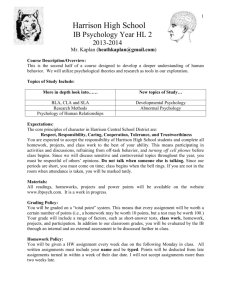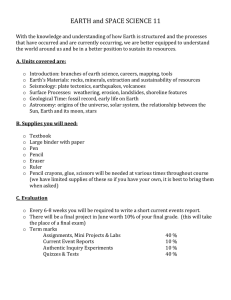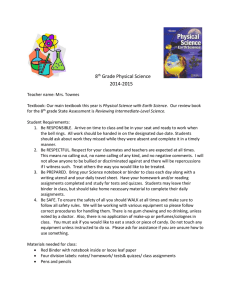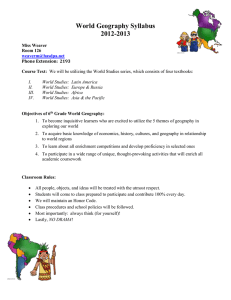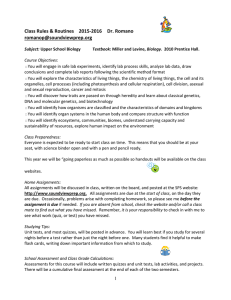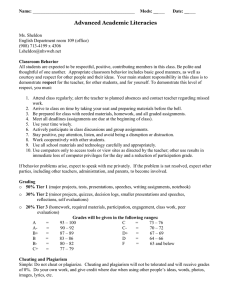World Geography syllabus 10-11
advertisement
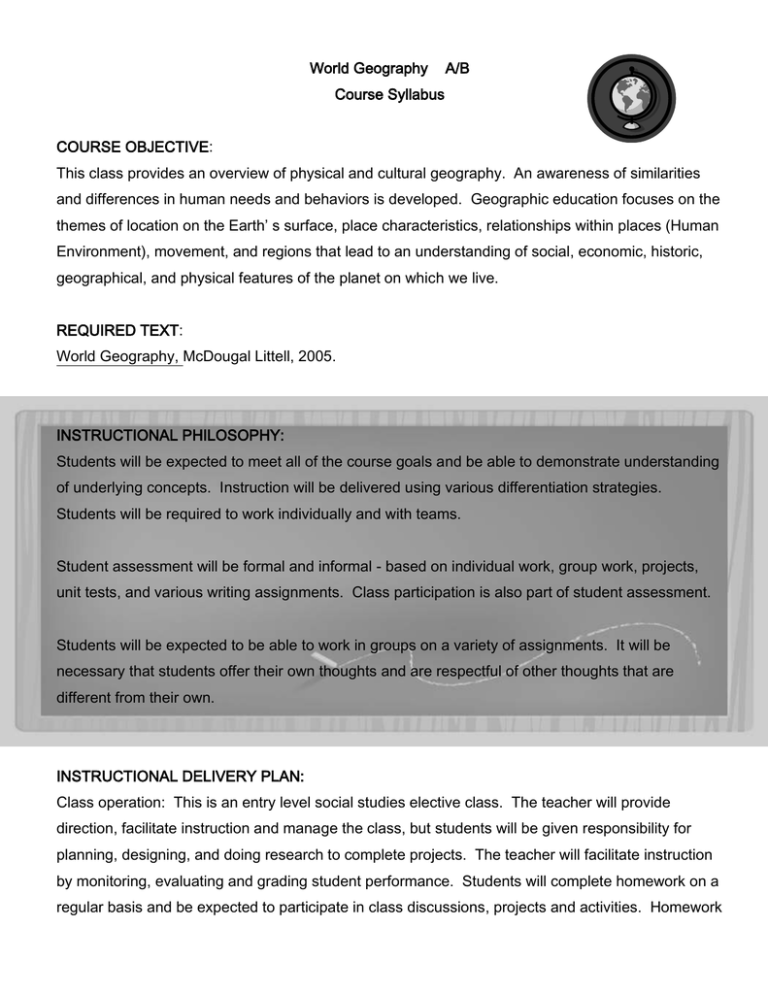
World Geography A/B Course Syllabus COURSE OBJECTIVE: This class provides an overview of physical and cultural geography. An awareness of similarities and differences in human needs and behaviors is developed. Geographic education focuses on the themes of location on the Earth’ s surface, place characteristics, relationships within places (Human Environment), movement, and regions that lead to an understanding of social, economic, historic, geographical, and physical features of the planet on which we live. REQUIRED TEXT: World Geography, McDougal Littell, 2005. INSTRUCTIONAL PHILOSOPHY: Students will be expected to meet all of the course goals and be able to demonstrate understanding of underlying concepts. Instruction will be delivered using various differentiation strategies. Students will be required to work individually and with teams. Student assessment will be formal and informal - based on individual work, group work, projects, unit tests, and various writing assignments. Class participation is also part of student assessment. Students will be expected to be able to work in groups on a variety of assignments. It will be necessary that students offer their own thoughts and are respectful of other thoughts that are different from their own. INSTRUCTIONAL DELIVERY PLAN: Class operation: This is an entry level social studies elective class. The teacher will provide direction, facilitate instruction and manage the class, but students will be given responsibility for planning, designing, and doing research to complete projects. The teacher will facilitate instruction by monitoring, evaluating and grading student performance. Students will complete homework on a regular basis and be expected to participate in class discussions, projects and activities. Homework assignments as well as other classwork assignments will be graded. Formative and summative assessments will be conducted to evaluate mastery of the standards. HOMEWORK POLICY: Homework must be completed at home and on time for the maximum amount of learning to take place. It is the student’s responsibility to keep up with each assignment. COURSE GOALS/ OUTLINE: 1. Understand and demonstrate proficiency in map skills and information processing. 2. Identify and explain aspects of resources, culture, and climate. 3. Describe and analyze the culture of Southwest Asia and North Africa. 3. Identify countries located in Sub-Saharan Africa, its climate, culture, economic systems and history related to its current culture. 4. Identify the countries of South Asia, East Asia and Southeast Asia. 5. Describe their varied cultures, belief systems and economic place in the world 6. Identify the countries within Europe, its climate, culture and economic systems. 7. Identify the characteristics of Russia and the Eurasian Republics that make them unique. 8. Compare and contrast major world religions. 9. Understand the major components of Latin America 10. Analyze its resources and become familiar with its culture. 11. Compare and contrast the United States and Canada 12. Describe the countries of Australia and Oceania and how they are unique. COURSE EXPECTATIONS AND STUDENT RIGHTS: All students are expected to be in class on time. All students are expected to bring materials to class…daily. Students are expected to follow all rules and procedures as stated in the Pebblebrook Student Handbook. Students are expected to remain in their assigned seat unless otherwise instructed. All students are expected to TRY! All Students are expected to take responsibility for their own learning. All students have the right to learn. Students do not have the right to distract the learning environment. Students do not have the right to misrepresent themselves. Students do not have the right to disrespect or discriminate against their peers, the teacher, or others in the learning environment. There will be no cell phones or head phones allowed in the classroom. This includes ipods, mp3s, or any other media device that plays videos or music. CLASSROOM PROCEDURES: Write down the Essential Question (EQ’s) daily. Write down and date all journal questions or warm ups. Sharpen your pencil during the first 10 minutes of class – the warm up/journal time. Keep book bags, notebooks, papers etc, behind or under desk. Turn all homework in to your class period basket THE FIRST 10 MINUTES OF CLASS. Passes for various emergencies will be issued on a case by case base. Handle all personal situations before entering class. Students are responsible for checking the class website for daily blog post for notes and missed assignments. STUDENT EVALUATION: Evaluation criteria Method of Evaluation Percent Quizzes/outside reading section and chapter related knowledge 20% assignments from the book, workbook 20% Class/Homework/Class Participation worksheets, group work Tests/Projects chapter and unit tests on 35% knowledge and application Mid-Term comprehensive knowledge 5% *Final Exam comprehensive knowledge 20% 5 POINT SCALE: All class/homework numerical grades are calculated on a 5 point scale; 5……………………………………………………………………………………………………100% 4……………………………………………………………………………………………………90% 3……………………………………………………………………………………………………80% 2……………………………………………………………………………………………………70% 1……………………………………………………………………………………………………60% 0……………………………………………………………………………………………………50% TUTORING/EXTRA HELP: I am available for extra help just see me for specific times. Tutoring is available through the Social Studies Department and Pebblebrook’s After School Tutorial Program. MATERIALS NEEDED FOR COURSE Notebook – three ring binder 2’ 5 dividers for binder Spiral notebook, composition notebook or supply of paper for daily notes Blue or black pen 2 packs of index cards for vocabulary flash cards Index card holder or Ziploc bags A Ruler, scissors, colored pencils, and or markers ABSENCES AND LATE WORK: Excused absences allow make-up work to be graded as stated in the student handbook. Students are responsible for producing appropriate documentation regarding absences. Students will have the number of days they are absent, plus one, to make up any work missed. Students are responsible for scheduling dates and times to make up missed exams, tests, or quizzes. Missed dates will result in a grade of 0. Late work will be deducted 50% for any assignment turned in past the stated due date. Any late work turned in AFTER the Formative Unit assessment/test will not be graded. MAJOR PROJECTS – LATE PROJECTS WILL NOT BE ACCEPTED EMAIL ADDRESS IS You may also call at 770-819-2521 ext. 239. My office hours are Please visit our class website STATEMENT of Acknowledgement: Please read and sign the Parent Contact Form acknowledging you have read the syllabus and received blog information.


